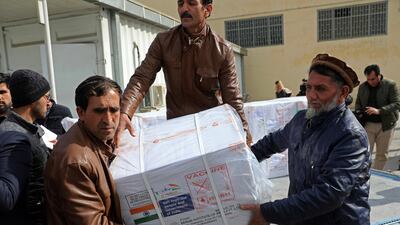Afghanistan received 500,000 doses of AztraZeneca's Covid-19 vaccine from India on Sunday.
The vaccines are the first to arrive in the country, which is awaiting emergency approval from the World Health Organisation before it can use them.
Ghulam Dastagir Nazari, head of immunisation at the country's health ministry, said the doses would be stored in Kabul until authorisation was received, which he hoped would be within a week.
The vaccines were produced by the Serum Institute of India, which is producing the Oxford-AstraZeneca vaccine for mid and low-income countries.
"The certification process is under way and hopefully it will be done in a week and we will start the vaccination process in all 34 provinces," said Mr Nazari.
Health workers, security force members, teachers and government employees would receive the vaccine first, he said.
The Afghan government has already trained 1,000 people to deliver the vaccine out of the 3,000 that will be needed to carry out its vaccination drive, he said.
Mr Nazari said China also planned to send 200,000 doses of the vaccine.
Afghan health officials said that the international Covax programme aimed at improving access to the Covid-19 vaccine for developing countries would provide vaccines to cover 20 per cent of the country's 38 million population.
Afghanistan has had 55,335 Covid-19 cases and 2,410 deaths from the disease, according to the health ministry.
WHO listed Pfizer and BioNTech's Covid-19 vaccine for emergency use on December 31 as it sought to accelerate vaccination in the developing world, which is badly lagging behind western countries.
A regional WHO official told Reuters this week that they were looking at the production sites for the AstraZeneca vaccine and hoped to make the decision on emergency use within weeks.

